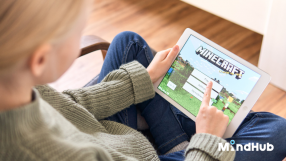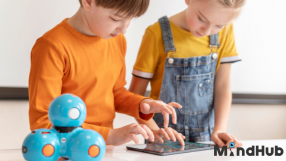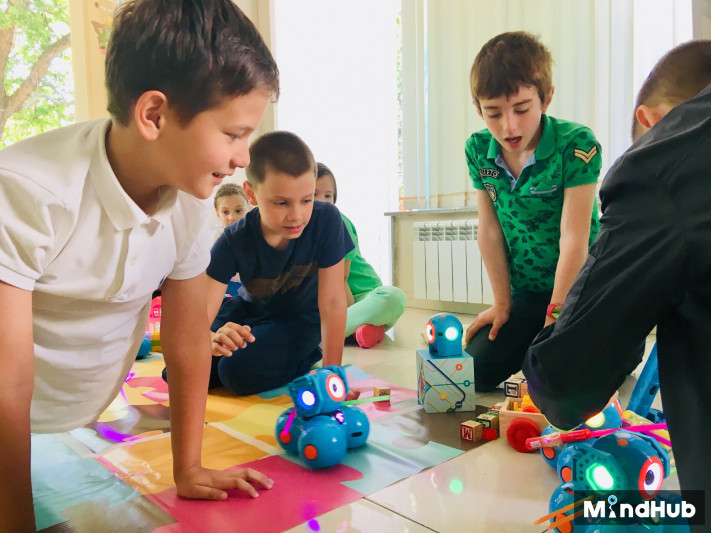
Have you ever wondered how to measure education’s quality, how to stimulate your kids to study, and whether they are developing in the right direction? One of the most important sources of information about the state of Bulgarian education and what we can improve with examples from other countries around the world is PISA - it is a test that examines the functional literacy of 15-year-old students.
At this age, all students around the world are at the end of their compulsory schooling. That’s why the study overviews students prepared to cope with life in modern society and the global world.
The test conducts every three years, covering three areas of knowledge: reading, mathematics, and science. At each stage, the emphasis is on one area, and the other two are in more general terms, usually with other competencies needed for the modern world.
According to its average result in mathematics and reading, Bulgaria is in the same group as Malaysia, Albania, UAE, Brunei, Romania, Montenegro.
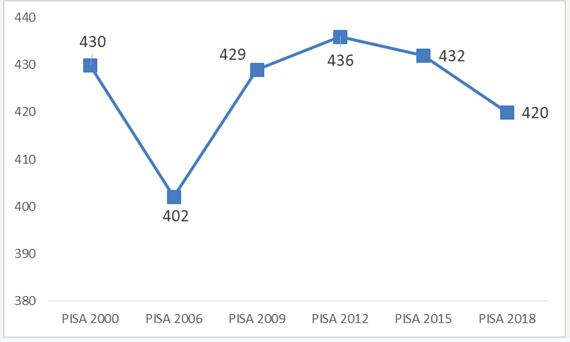
Figure 1: Comparison between the average reading results of Bulgarian students in PISA 2000, 2006, 2009, 2012, 2015 and 2018
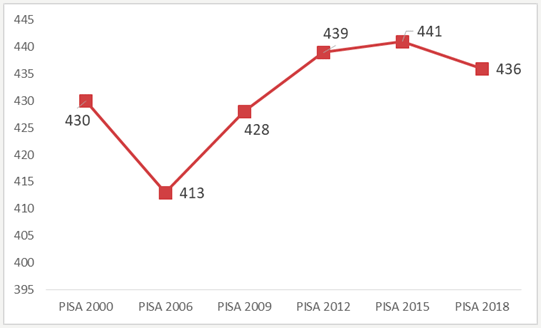
Figure 2: Comparison between the average results in the mathematics of Bulgarian students in PISA 2000, 2006, 2009, 2012, 2015 and 2018
We are sure that the graphics and statistics don’t surprise you, but let's ask ourselves whether the school is the main place where children can develop their skills. We at MindHub strongly believe that if you want your child to have the desire and incentive to learn and gain new knowledge, you need to think about his activities outside the classroom walls.
Studying with games
Learning through games is probably one of the most effective approaches you can use for your child. It is an educational tool that provides opportunities for more in-depth learning and the development of many skills and helps motivate children and their interest in education.
When kids see something for a game, their mind takes pleasure in learning a new system, approach, perceptions, and association with other games they know.
All this stimulates children to want to participate in the process and learn as much as possible.
The effectiveness of educating through games is not only because of the fun but also because of teamwork, competitive aspects, and satisfaction from success.
If you manage to combine your child's interests with a given subject, this can lead to a much more successful and easy learning process. For example, a teenager who loves computer games will indeed find programming very interesting, presented to him as a fun process. Math and English will become favorite subjects for kids when they get acquainted with creating games and following logical steps.
MindHub training - useful and pleasant
At MindHub, we believe that quality education will help and guide children in their future career choices. From an early age, we can prepare them for future professions, and together we can contribute to their successful development.
We know that the material is not easy, but we believe that with the help of Mathematics, English, and Computer sciences, we will contribute to a better future for every child.
Our mentors work hard to make the learning process for children fun, so they have the ambition to learn, develop, and open their minds more and more to the new and unknown.
How does MindHub include Math, English, and Computer sciences in the program?
Children in our programs meet Mathematics on the first day of the program. However, it is not the standard boring and dry theory, but something much more fun.
In programming, Math is about moving our characters around the screen, changing their costumes, the color of the character, and his sensitivity. We monitor the results of the games we create, determine the speed at which the characters move, gravity, and many other fun proportions that we must learn to create and manage games.
How do we do it? We use the coordinate system to explain to the children exactly how our character moves on the screen.
English, on the other hand, is embedded in every project in the MindHub program. Students must deal with the matter in the educational process and get used to the correct programming terminology from an early age. After completing our program, they must prepare for writing code and getting things to the next level.
Everything children are learning is in English, including instructions and menus. To make it understandable, our mentors explain thoroughly in an easy and accessible way for their age, but at the same time, using English terminology to get children used to the specifics from the very beginning.
Each part of our program helps children understand how computers work and how programming is part of our daily lives. Using interactive and non-standard approaches, we will teach them how to type on a keyboard and create and search different files and folders. Finding solutions to all problems, dealing with existing sequences of commands, developing algorithms, and many more aspects that small programmers have to discover.
With MindHub, learning Math, English, and Computer sciences is easier, more exciting, and fun. Charts and dictionaries are left in the classroom, and during our activities, children get to know the fun side of learning.
Learning can be an adventure!
Learning is a process that requires not only concentration and discipline but also motivation and interest. To challenge our children with it, we can make it much more fun, and the result is not just accumulated scientific knowledge, but also a personal one.
MindHub's mission is not only to teach kids all the technology tools but to educate them to use technology in a meaningful way to build their skills. Skills such as teamwork, perseverance, focus, logical thinking, and analytical skills.
We focus our work on the principles and ethics of working with technology - how children find meaning in the ocean of information, to be creators and to share with the world, while not just gaining knowledge, but accepting the process as an adventure, they want to be part of.
